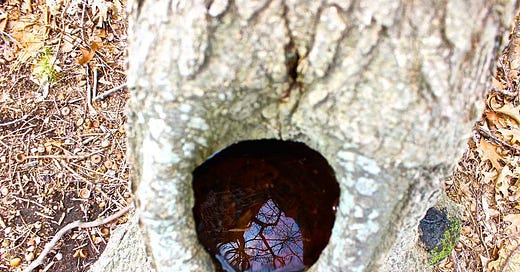I’ve been thinking about the first book of poetry I ever bought—Seamus Heaney’s Selected Poems 1966-1987. It was for my first creative writing class in college. I didn’t understand a word. Or maybe it’s more accurate to say I only understood individual words: bone, bog, blackberry.
The one poem that sparked something in me was “Digging,” Heaney’s most famous. It reminded me of my dad digging for nightcrawlers in our garden. The phrase “nicking and slicing” conjured hot summer afternoons, my dad’s boot heavy on the spade, sinking it into the earth and wedging out a scoop and bashing it apart. I saw the nightcrawlers, too—fat, slimy things, some of them bisected and bloodied—writhing in the sunlight.
It took me years to realize that a memory like that—the evocation of it—is as much a part of a poem’s meaning as any its writer might intend. Poems are infinity mirrors, a paradox of surface and depth. In conjuring my dad and our fishing trips, Heaney also conjured me, the boy who’d watched his dad pull bluegill and rock bass from Wildcat Creek, cleaning a mess of them at dusk, their sleek, spotted bodies dampening the newspaper he put down on the back porch. I held it all so close—the humid air, locusts buzzing in the trees, the little grunting breaths my dad let out as he worked, the fishes’ glistening orange egg sacs and blood-red gills.
There is an immediacy to childhood that once we master language never quite comes back. In the absence of abstract thought, we know ourselves moment to moment by the world around us and what we can hold in our hands. There is no story to navigate, only raw experience.
For a fleeting moment, intimacy is everything.
In a poem like “Digging,” that intimacy lives on in the selfsame language that distances us from ourselves. In a stanza near the end, Heaney begins a story about his grandfather, a turf cutter on Toner’s bog, writing: “Once I carried him milk in a bottle/ Corked sloppily with paper.” That surprising last word—paper—reverse-engineers the entire couplet, calling back the bottle in greater detail, and, in turn, evoking the hand that held it, the boy, the bog, the feeling of years gone by.
That sloppily corked bottle is the kind of idiosyncratic detail only a child would have held onto. The smallest and simplest of things haunt us.
That sloppily corked bottle is the kind of idiosyncratic detail only a child would have held sacred. The smallest and simplest of things haunt us. Despite our best efforts to understand ourselves and the world, understanding remains elusive. Once my dad brought home a 17-pound snapping turtle from the creek. After butchering it for dinner, he handed me his knife and said I could poke around inside if I wanted to. Blood made the handle slippery but I leapt to work, unspooling soft coils of intestines and carefully slitting them open to reveal turtle shit, bits of broken fish bones, half-digested crawdads. What had I expected to find? What am I looking for now, opening up that turtle again after 40 years?
In grad school—years after buying and struggling through his book—I got to see Heaney read in person. He looked just like his author photo—dark suit and tie, shock of white hair, eyes that glimmered. He read about Ireland, family, violence. He read his famous bog people poems. He read “Digging,” prefacing it with a story about how upon finishing the poem he felt as though something inside him had shifted, that he’d begun, for the very first time, to feel the power of his craft.
Elbow to elbow with classmates and professors in the crowded auditorium, I hung on every word. It didn’t matter that I was maybe a decade away from writing even one true line. I knew what he meant.
During the Q & A afterward, I did something I never do—I stood and gestured for the microphone being passed around. I wanted to speak, to somehow connect with the man, if only for a moment. Members of the audience shifted in their seats and turned to look, curious, expectant, the half-moons of their faces pale and waxy under the fluorescent lights. I squeezed the microphone.
“You mentioned when you finished writing ‘Digging’ that something felt different,” I said. “What did you feel?”
On stage, having fielded thousands of questions across the span of his career, Heaney sipped from a glass of water before answering. “Well,” he finally said, a grin spreading across his face. “I felt good.”
I’ve chased that good feeling across the page now for over 30 years. It started with Heaney’s book. It started with a knife and 17-pound snapping turtle. It started on nights I couldn’t sleep and lay in bed listening to my mother down the hall in the kitchen, cleaning up the dinner dishes like she did every night. The clink of stacked plates and glasses. The scrape of a fork clearing scraps into the trash and thumping the bin. It started with lines only Heaney could have inspired me to write: Those weren’t crumbs my mother/ swept from the counter into her palm—/ they were years.






Wow, such a beautifully written and descriptive piece! Thank you for sharing.
So glad to have discovered your corner of Substack. I’ve taught that poem many times—as an example of an ars poetica. It really strikes to the heart of what poetry does (and how it does it)—how we dig into our memories and experiences hoping to find the “good dirt.”